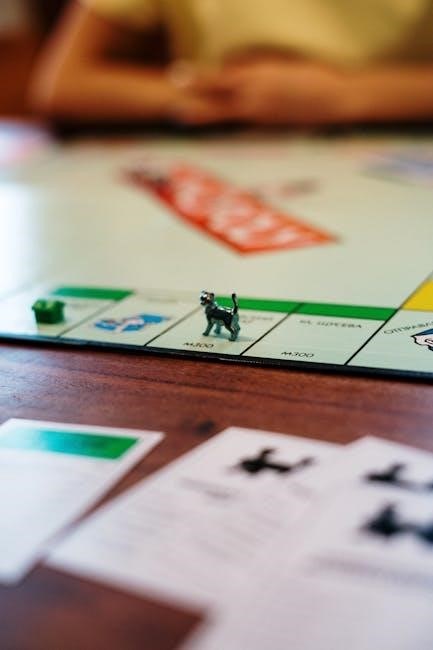Discover the official Monopoly rules and strategies in this comprehensive guide․ Learn setup, gameplay, and tips to master the classic board game of wealth and negotiation․
Overview of the Game
Monopoly is a classic board game of strategy and negotiation where players compete to become the wealthiest․ The game involves buying, trading, and developing properties, collecting rent, and strategically managing finances․ Designed for 2-6 players aged 8 and above, it combines luck, skill, and deal-making․ The goal is to bankrupt opponents while accumulating the most assets․ Key elements include dice rolling, Chance and Community Chest cards, and building houses and hotels․ The game is ideal for family game nights and teaches financial management and strategic thinking․ Its timeless appeal makes it a staple in many households worldwide․
Importance of Following Official Rules
Adhering to the official Monopoly rules ensures a fair and enjoyable experience for all players․ Proper rule-following prevents disputes and maintains the game’s balance, allowing everyone to understand their rights and responsibilities․ Official guidelines cover setup, gameplay, and winning conditions, guaranteeing consistency across different editions․ By following these rules, players can fully engage with the game’s strategic depth and financial mechanics․ Whether you’re a newcomer or an experienced player, sticking to the official rules enhances the game’s integrity and fun, making it a timeless classic for generations of players․
Where to Find Official Monopoly Rules
Official Monopoly rules are readily available in multiple formats․ The game’s rulebook is included with every purchase, providing detailed instructions․ Additionally, Hasbro offers downloadable PDF versions of the rules for various editions on their official website․ Players can also find digital copies through trusted sources like OfficialGamerRules․org․ For specific editions, visiting Hasbro’s Consumer Care section and using their search tool ensures access to accurate guidelines; These resources guarantee that players can easily reference the rules, whether they’re learning the game or resolving disputes during play․

Setting Up the Game
Place the board on a table, shuffle and position Chance and Community Chest cards face down․ Each player selects a token and receives $1,500 in specified denominations․
Number of Players Required
Monopoly is designed for 2 to 6 players, making it an ideal family or group activity․ The game is recommended for players aged 8 and above, with a typical duration of 90 minutes․ At least two players are needed to start the game, ensuring active competition and strategic interaction․ With more players, the game becomes more dynamic, as trading and negotiations intensify․ It’s not suitable for children under 3 due to small components and complex rules․ Ensure all players agree on the rules before beginning to avoid disputes and ensure a smooth gameplay experience․
Equipment Needed for the Game
To play Monopoly, you need a game board, 2 dice, 28 Title Deed cards, 16 Chance cards, 16 Community Chest cards, 32 houses, 12 hotels, play money, and player tokens․ Each token represents a player’s movement around the board․ The Bank manages all financial transactions, including money, properties, and buildings․ Ensure all components are present before starting․ The Banker distributes funds and oversees purchases, while players use tokens to mark their progress․ Additional materials like paper for loans may be needed if the Bank runs low․ Always verify the completeness of the set to ensure smooth gameplay․
Preparing the Bank and Distributing Money
Select a Banker to manage the game’s finances․ Each player receives $1,500 in a specific breakdown: 2 $500s, 2 $100s, 2 $50s, 6 $20s, 5 $10s, 5 $5s, and 5 $1s․ The Bank holds the remaining money, Title Deed cards, houses, and hotels․ The Banker must keep their personal funds separate from the Bank․ The Bank sells properties, auctions items, and handles loans․ If the Bank runs low, the Banker can issue additional money using ordinary paper․ This setup ensures fair distribution and smooth gameplay․ The Banker’s role is crucial for maintaining game balance and overseeing transactions․
Selecting the Banker
The Banker is a player chosen to manage the game’s financial transactions․ Their role is to distribute money, oversee property sales, and handle auctions․ The Banker must keep their personal funds separate from the Bank․ They are responsible for issuing money, collecting taxes, and providing loans․ The Banker ensures smooth gameplay by maintaining accurate records and managing the game’s economy․ Trustworthiness and organizational skills are essential for this role․ The Banker’s duties include handling all monetary exchanges, selling properties, and maintaining the integrity of the game’s financial system․ Their role is crucial for fair and efficient gameplay․
Understanding the Objective
Monopoly aims to become the wealthiest player by acquiring properties, collecting rent, and strategically managing resources․ The goal is to outperform opponents in financial dominance and negotiation․
Becoming the Wealthiest Player
Becoming the wealthiest player in Monopoly requires strategic acquisition of properties, smart financial management, and tactical negotiations․ Players aim to dominate through buying, renting, and selling real estate․ The goal is to accumulate the highest net worth by collecting rent, building houses and hotels, and driving opponents to bankruptcy․ Effective trading and negotiation can further enhance your position․ Managing cash flow is crucial, as is the ability to adapt strategies based on the game’s progression․ The wealthiest player is determined by their financial dominance and ability to outlast all opponents in the game․
Gameplay Basics
Move your token clockwise around the board based on dice rolls․ Buy properties, pay rent, or draw cards․ Pass “GO” to collect $200․ Handle doubles and special spaces carefully․
Moving Around the Board
Players roll two dice to determine their movement․ The token advances clockwise, with doubles allowing an extra roll․ Passing “GO” grants $200․ Spaces may require purchases, taxes, or drawing cards․ Jailings halt movement temporarily, while certain cards can alter positions․ The board’s direction and dice outcomes shape each turn’s progression, balancing strategy and chance․ Movement rules are consistent, ensuring fairness and clarity for all players․ Proper dice handling and space adherence are essential for smooth gameplay․ Each move impacts the game’s progression and a player’s financial standing․ Movement is a core mechanic driving Monopoly’s strategic depth and player interaction․
Handling Doubles and Multiple Rolls
When doubles are rolled, the player moves the sum of both dice and rolls again․ A third consecutive double sends the player to jail․ Multiple rolls increase chances of landing on key spaces but also risk penalties․ Each roll must be resolved fully, with no interruptions․ The player retains the dice after doubles, continuing their turn․ This rule adds excitement and strategic depth, as repeated doubles can lead to significant consequences․ Proper handling ensures fair progression and maintains the game’s dynamic flow, blending luck and strategy seamlessly․
Passing the “GO” Space
Every time a player passes or lands on the “GO” space, they receive a $200 salary from the Bank․ This applies when passing “GO” during normal play or when advanced via a Chance or Community Chest card․ However, the $200 is only paid once per full circuit around the board․ If a player passes “GO” and lands on a Chance or Community Chest space that instructs them to move to “GO” again, they collect $200 for each passage․ Landing directly on “GO” is required to receive the payment; passing it without landing does not trigger the salary․ This rule incentivizes strategic movement and timely card plays․

Property Management
Effectively managing properties involves buying, trading, and developing them to maximize rent and minimize costs․ Owning color groups and building houses or hotels can significantly increase revenue․ Strategic management ensures sustained cash flow and competitiveness in the game․
Buying and Owning Properties
When landing on an unowned property, you can buy it from the Bank at its listed price or opt for an auction if you decline․ The Bank handles all transactions, and the owner receives a Title Deed card․ Owning properties allows you to collect rent, with higher rates for complete color groups․ Properties can be mortgaged for cash in emergencies, but this halts rent collection․ Strategic buying and owning are crucial for building wealth and outperforming opponents․ Proper management ensures long-term financial success in the game․
Auctioning Unwanted Properties
If a player declines to buy a property, the Bank auctions it to the highest bidder․ Any player, including the one who rejected the purchase, can participate․ Bidding starts at any price, and the Bank collects the winning bid․ The auction ensures properties are sold, keeping the game dynamic․ This process prevents unused properties and encourages strategic bidding․ The Bank issues the Title Deed to the winner, completing the transaction․ Auctions add excitement and competition, ensuring all properties are utilized effectively in the game․
Mortgaging Properties for Cash
When financial difficulties arise, players can mortgage properties to the Bank for immediate cash․ The Bank pays half the property’s printed value, and the Title Deed card is placed face down․ Mortgaging allows players to stay in the game but prevents them from collecting rent on that property․ Properties must be unmortgaged before they can generate income again․ To unmortgage, players must repay the loan plus 10% interest․ This strategic option helps manage cash flow but reduces potential earnings, making it a critical decision in maintaining financial stability during gameplay․
Collecting Rent from Other Players
When a player lands on a property owned by another, they must pay rent as specified on the Title Deed card․ Rent amounts vary based on the property’s location and improvements like houses or hotels․ If a player owns all properties in a color group, they can charge double rent for unimproved properties․ However, no rent is collected if the property is mortgaged․ The owner must request rent before the next player rolls the dice; otherwise, the opportunity to collect is lost․ Rent collection is a key aspect of building wealth and bankrupting opponents, making it a crucial part of the game strategy․

Rent and Utilities
Rent for utilities is determined by dice rolls․ Owners collect four times the dice value when others land on their utility properties․ This unique rule adds strategy․
How Rent Works
Rent is collected when a player lands on a property owned by another․ The amount depends on the property’s value and any improvements like houses or hotels․ If a property is mortgaged, no rent is paid․ Owners must request rent before the next player’s turn to collect․ Utilities charge rent based on dice rolls, with payments made directly to the owner․ Properly managing rent collection is crucial for maximizing profits and driving opponents toward bankruptcy, making it a key strategic element in the game․
Utilities and Their Role in the Game
Utilities, such as the Electric Company and Water Works, function differently from other properties․ When a player lands on a utility, they pay the owner four times the sum rolled on the dice․ Owning both utilities allows for higher charges, doubling the potential income․ Unlike color-group properties, utilities don’t require building houses or hotels to increase rent․ Their unique payment system makes them a strategic asset, providing steady income without the need for development․ Utilities add a dynamic layer to the game, offering players opportunities to gain financial advantage through smart acquisitions and tactical play․
Importance of Color Groups
Owning all properties in a color group grants a player significant strategic advantages․ When a player acquires a complete color group, they can charge double rent for unimproved properties within that group․ This rule applies even if other properties in the group are mortgaged, enhancing the owner’s earning potential․ Color groups also serve as a bargaining chip in trades, as they allow players to negotiate for missing pieces to complete their sets․ The ability to build houses and hotels on these properties further amplifies their value, making color groups a cornerstone of effective Monopoly strategy and financial dominance in the game․
Chance and Community Chest Cards
These cards add unpredictability and excitement to the game, offering rewards, penalties, or unique actions․ Players must draw and follow the instructions when landing on these spaces․
Using Chance and Community Chest Cards
When a player lands on a Chance or Community Chest space, they must draw the top card from the respective deck․ These cards provide instructions that players must follow immediately․ They may offer rewards, such as collecting money, moving spaces, or gaining immunity from rent․ Other cards may impose penalties, like paying fines or taxes․ The Get Out of Jail Free card is a valuable asset that can be used to leave jail without penalty or sold to another player․ Players should always resolve the card’s instructions before continuing their turn․ These cards add unpredictability and excitement to the game, keeping players on their toes․
Jail Rules
Landing on the “Go to Jail” space, drawing a “Go to Jail” card, or rolling doubles three times sends you to Jail․ While in Jail, you cannot collect rent or move․ To exit, you can roll doubles, use a Get Out of Jail Free card, or pay a $50 fine․ Jail limits your gameplay temporarily but doesn’t end your chances of winning․
Landing in Jail
Landing in Jail occurs if you draw a “Go to Jail” card, roll doubles three times, or land on the “Go to Jail” space․ Move your token directly to Jail without collecting $200․ Your turn ends immediately upon entering Jail․ While in Jail, you cannot move or collect rent but can still buy, sell, or trade properties․ To exit, you must roll doubles, use a Get Out of Jail Free card, or pay a $50 fine․ If you land on Jail without being sent there, you are “Just Visiting” and incur no penalty, continuing play as usual․
Getting Out of Jail
To exit Jail, a player has three options: roll doubles on their next three turns, use a Get Out of Jail Free card, or pay a $50 fine․ If doubles are rolled, the player moves forward according to the dice roll and resumes play․ Using the card allows immediate release without penalty․ If the fine is paid, the player exits Jail after the payment but does not move on that turn․ While in Jail, players can still buy, sell, or trade properties but cannot collect rent or move․ If doubles are not rolled within three attempts, the $50 fine must be paid to exit․

Free Parking
Landing on Free Parking offers no rewards or penalties․ Optionally, players can collect all taxes and fines placed here, making it a strategic resting spot․
Rules for Free Parking
Landing on the Free Parking space does not reward or penalize players in any way․ It serves as a neutral resting place during gameplay․ However, an optional rule allows players to collect all fines and taxes accumulated throughout the game when landing on this space․ This can add an extra layer of strategy, as players may aim to land here to gain additional funds․ The decision to implement this rule is typically agreed upon before the game begins․ Regardless, Free Parking remains a non-transactional space, providing a brief pause in the competitive flow of the game․

Building Houses and Hotels
Players can build houses and hotels on owned properties to increase rent revenue․ Houses must be built evenly across all properties in a color group, and hotels require four houses per property․
Rules for Building Houses
Players can build houses on properties they own, but only after acquiring all titles in a color group․ Houses must be built evenly across all properties in the group․ The maximum number of houses per property is four․ Houses significantly increase the rent players must pay when landing on these properties․ To build, players pay the Bank the cost listed on the property’s Title Deed card․ Building houses strategically enhances rental income and strengthens financial control․ Always ensure funds are available for building, as it’s a key part of advancing toward victory․ Proper house management is essential for maximizing profitability and driving opponents to bankruptcy․
Limits on Building Construction
Building in Monopoly is subject to strict limits to ensure balanced gameplay․ Players can construct a maximum of four houses on any property, followed by one hotel․ Houses must be built evenly across all properties in a color group; no property can have more houses than others in the same group․ Hotels require all four houses on a property to be built first․ The game also has a total limit of 32 houses and 12 hotels․ Once these limits are reached, no further construction is allowed․ These rules prevent excessive dominance and maintain competitive balance, ensuring strategic depth in the game․
Strategies for Building Optimally
Optimal building in Monopoly involves strategic planning to maximize rental income while managing costs․ Prioritize acquiring complete color groups to unlock building opportunities․ Always build evenly across properties in a group to maintain balance and adhere to rules․ Focus on high-rent properties like Boardwalk and Park Place for maximum returns․ Manage cash flow carefully to avoid financial strain․ Negotiate trades to complete color groups and concentrate buildings on high-value properties․ Timing is crucial—build when it enhances your position without overextending․ Adapt strategies based on opponents’ actions and game progression to ensure long-term profitability and competitive advantage․

Endgame Scenarios
The game concludes when one player achieves bankruptcy, eliminating them, or when a set condition is met․ The last remaining player or the one meeting the condition wins․
Bankruptcy and Elimination
A player goes into bankruptcy when they cannot pay debts, such as rent or fines․ They must mortgage or sell properties to the Bank or other players․ If unable to pay, they are eliminated․ Remaining players continue, and the game ends when only one player has assets․ The Banker ensures the Bank never runs out of money, issuing additional funds if needed․ Bankruptcy occurs when a player’s total worth is insufficient to cover liabilities․ The eliminated player leaves the game, and their assets are distributed․ The last remaining player is declared the winner, ending the game officially․ Bankruptcy marks the end of a player’s journey in Monopoly․
Victory Conditions
Victory in Monopoly is achieved when one player accumulates all the assets, eliminating others through strategic moves․ The game ends when a player bankrupts all others, acquiring their properties․ The goal is to become the wealthiest by buying, trading, and developing properties․ The winner is the last remaining player with assets․ Victory is determined by financial dominance, driving others to bankruptcy․ The game concludes with one player owning everything, securing their win․ Monopoly rewards strategic planning and financial acumen, making it a classic test of economic strategy․
Ending the Game Early
Monopoly games can conclude early if all players agree to end the game․ This often happens when one player holds a significant advantage, making further play unnecessary․ The game may also end early if all properties are owned and no bankruptcy has occurred, though this is rare․ Players can mutually decide to stop, often to save time or due to an obvious winner․ Early endings are uncommon but allowed, ensuring flexibility for players․ The game officially ends when all assets are transferred, or a winner is declared, but early stops are permitted by consensus․ This rule adds convenience to gameplay․

Advanced Strategies
Mastering Monopoly requires skillful negotiation, strategic trading, and smart financial decisions․ Focus on acquiring high-value properties and managing resources effectively to outmaneuver opponents and secure victory․ Use advanced tactics like bargaining for advantageous trades, prioritizing property upgrades, and maintaining cash reserves to withstand financial setbacks․ By balancing risk and opportunity, players can dominate the game and emerge as champions․ These strategies elevate gameplay beyond basic rules, ensuring long-term success in competitive matches․ Elevate your approach to become a formidable Monopoly player․
Negotiation and Trading
Negotiation and trading are crucial strategies in Monopoly․ Players can trade properties, cash, or even future favors to strengthen their positions․ Aim to acquire complete color groups to charge higher rents․ Offer deals like rent reductions or cash incentives to secure trades․ Timing is key—strike deals when opponents need cash or when you can gain a strategic advantage․ Trading effectively can help you build a monopoly, limit opponents’ options, and accelerate their bankruptcy․ Always assess the value of properties and negotiate terms that benefit your long-term goals․ Mastering negotiation can turn the tide of the game in your favor, ensuring victory․ Trade wisely and strategically․
Financial Management Tips
Effective financial management is key to success in Monopoly․ Always maintain a cash reserve to pay rent, taxes, and unexpected expenses․ Prioritize purchasing high-value properties and negotiate trades to strengthen your portfolio․ Avoid overspending on houses and hotels until you have a steady income stream․ Use mortgages strategically to stay solvent but avoid over-mortgaging, as it limits your earning potential․ Keep track of other players’ financial states to identify opportunities for advantageous trades or negotiations․ Smart budgeting and strategic spending will help you outlast opponents and build a monopoly that leads to victory․ Manage your finances wisely to maximize profits and minimize risks․
Monopoly Variations and House Rules
Monopoly offers various editions and house rules to customize gameplay․ Themed versions, like movie or sports editions, add unique twists․ House rules, such as freezing rents or adjusting auction limits, enhance strategy․ Some players allow “house rules” like doubling rents for full color groups or enabling partial payments․ Free Parking payouts, such as collecting all fines and taxes, are popular variations․ Players can also introduce time limits or team play for faster or collaborative games․ These modifications keep the game fresh and tailored to preferences, ensuring endless fun and competitive experiences for all players․
